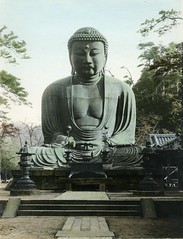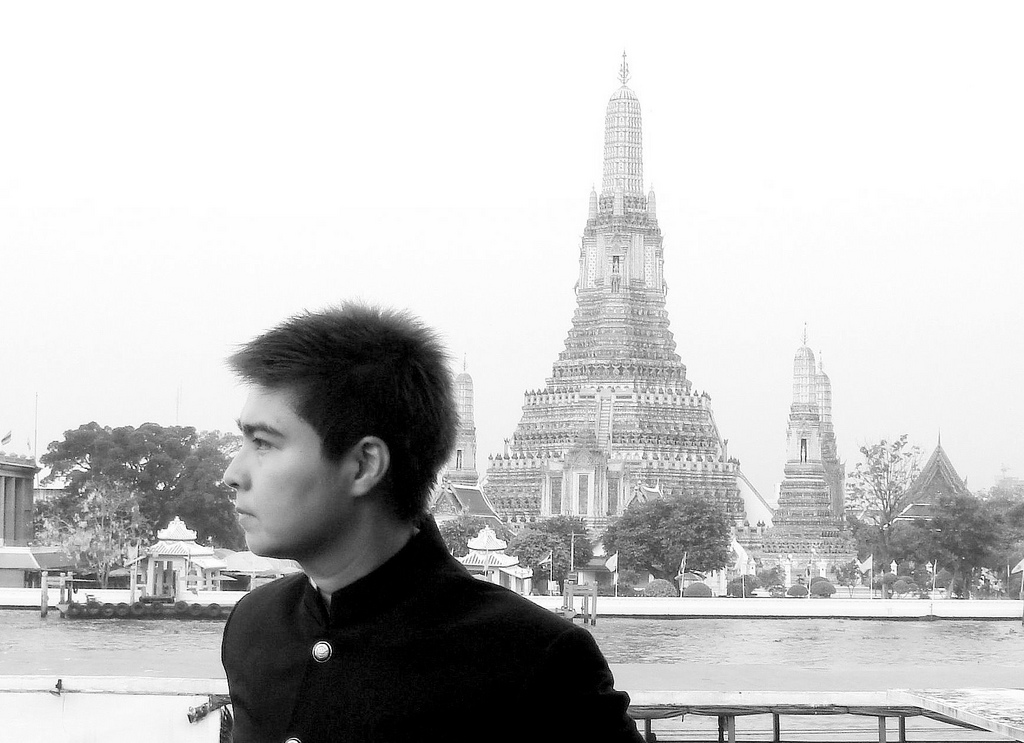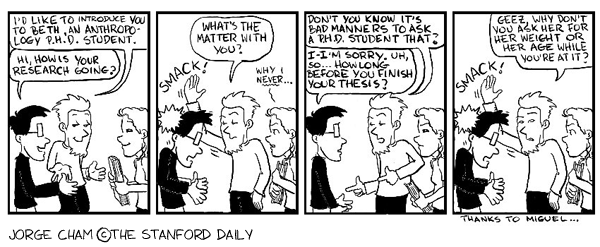Day 13: Met w/ Advisor, Got New Direction
Well, depends how you look at it. There are both good news and bad news.
Bad news first. After an hour of a very fruitful discussion, he gave me a new direction again! In other words, I would not be doing what I have been painstakingly putting together during these past few weeks anymore. But that's normal for Ph.D. students. We do change our topics or directions for thousands of times before it sort of comes together.
But it was not so bad as Apollo 13! What I mean is that, my proposal was not completely shot down. We did not really take it apart. My advisor quite liked it, actually. And he also believed and said, perhaps for the first time, that looks like I'm going to make it this time (!). He told me to keep the Bushido part (which is exactly what I had in mind!), and ditch the Budo practice. That could take the role of background support info.
Now comes the big announcement. He wants me to take the SOCIOLOGY OF LITERATURE's approach! Basically, I'm going to do a content analysis of Bushido literature from Tokugawa period! And may be some other literature by samurais during that time. I have the list of books I want to do already! It is in the Table of Content of the Introduction Chapter I gave him today. But may be I have to do some more research on Japanese literature, just in case that question comes up during my defense...
In fact, it's back to square one. Because this is what I originally proposed to JSPS and got my research grant for: looking for mindfulness elements in Bushido literature from Tokugawa period and analyze it in the social context of Tokugawa society in order to understand it better!
So, I think my advisor purposedly let me trying to find my way around for 3 years, reading everything I could relating to sociology, only to find out that my initial hunch was right in the first place! Gosh, what a clever way to teach! He has been very patient for 3 years, watching me growing up academically. Or have I? hmmm...May be not, because I guess I have forgotten what I read in the first year already! Darned!
Anyway, his approach is similar to my sword sensei, though. He waits until he sees that I'm ready. Then he told me what to do next. Sort of. He did not really tell me what to do, just give me more list of books to read (as usual) and told me to write. However, this time I really have to catch up fast with the reading list which I normally was too lazy to do. Big mistake! The list piles up fast, man! And before you know it, you feel you are never going to make it!
So, the first thing I did after coming back home after seeing him was Googling "Sociology of Literature." I groaned soon after the result came up? Why? First, the field was not covered in Wiki. And for me, if it is not in Wiki, then, something must be really, really wrong!
And, boy, was I right! Gosh, how come my advisor always send me on to the most difficult path? Why is that? Consider this:
The sociological interpretation Of literature is not a favorite son of organized social science. Since the emancipation of the study of literature from the rigid research dicta and historically cogent laws of philology, almost everybody with a fair access to reading and writing feels entitled to offer historical, aesthetic, and sociological criticism and generalization. The academic disciplines which have been traditionally charged with the history and analysis of literature have been caught unaware by the impact of mass literature, the best seller, the popular magazine, the comics and the like, and they have maintained an attitude of haughty indifference to the lower depths of imagination in print. A field and a challenge have thus been left open and the sociologist will have to do something about them.Frankfurt School: On Sociology of Literature by Leo Lowenthal 1948http://www.marxists.org/reference/archive/lowenthal/1948/literature.htm
Like John Lennon once said, you win some, you lose some. You can't really have it all, I guess. But if you ask me how I felt after my first meeting with my chief advisor for the first time in what seems like aeons, I guess it's pretty ok. At least I got the answers I wanted for today. And I could work with more focus, although it seems I'm going to have even more work load than ever before with the new area I have to cover (soc of lit) and also some other books he mentioned today.
Again, the takeaway from this meeting is
- Keep Bushido, drop Budo.
- Drop Leadership Theory, develop own Operational Term for "Mindfulness" to use in Content Analysis.
- Methodology = Content Analysis.
- Content to be Analyzed = Bushido Literature from Tokugawa Period.
- Analytical Framework to make it Soc of Lit instead of just literature review = "Social Millieux" (or should it be Millieure?)
He also mentioned about Great Tradition and Little Tradition. Oh, there are still many more to read and understand. He emphasized the use of language and its symbolic interpretation. He also listened with interest and expressed agreement when I explained the changing meaning of the word "Nen" in Japanese to him. He said I could include that in my dissertation also.
So, what theories are we looking for now? Social exchange theory? Symbolic theory? Gee, I start to sound more and more like the professor in the Davinci Code who interprets the meaning of stuff in history. But that's what I'm about to set to do, to "decode" Bushido, the code of conduct for the legendary Tokugawa Samurai.
There you go, another title for my dissertation. I should start keeping tab of the ever-changing title of my dissertation, actually. May be that would be the last finishing touch of the whole work even! Don't you think?
Ok, as of today, let it be recorded as:
Tokugawa Samurai's Code of Conduct"
Hmm...I like it. Sounds like "Matrix Reloaded" and "Da Vinci Code" reel into one! hee hee hee Well, we'll see if I could really reload it from the past decode it and deliver what this title promises!










2 comments:
I don't know if I'm right or wrong but sounds like what you are going to do is similar to "discourse analysis" ?
http://sociocritique.mcgill.ca/theorie/discourse%20theorie.htm
Thanks for your comment ja.
Well, not exactly. From my reference book here at home (Haralambos & Holborn, 2004, p. 840), discourse analysis seems to be presented differently na. Slightly. I tend to see my work as primarily thematic and I could incorporate formal content analysis into it also, if needed be ja.
Discourse analysis, as I read it in p. 840, seems not only to "represent" reality but also "create" reality. In this case, I don't want to go that far to burden myself to proof that na.
My initial goal is just to identify the "theme" of mindfulness first. In my introduction, I was treating mindfulness more as a "coping mechanism" that samurais turn to in time of suffering na. It helps them find a place and method to put their mind to in time of confusion and stuff. And during Tokugawa time, there were plenty!
Then, in pp. 581-585 of the same book I have, Discourse Analysis seems to be introduced in close relation with theories of power. Well, I don't think that I would be ready to apply discourse analysis to my work yet when, according to Madad Sarup (1988), by "discourse" Foucalt meant "practices that systematically form the objects of which they speak."
In this case, even if I am successful in identify the "mindfulness" theme and textual elements in Bushido literature, I don't want to go one step further to proof again that the audience would become mindful or live a mindful life. That would be beyond the scope of my study laew la.
True I started out like that, but I think I have to remain focus and try not to overreach la. I think I just go back to basics, treating "mindfulness" more as "coping mechanism" for sufferings that could have a "windfall benefit" of self-control or something like that for Tokugawa samurai.
What I'm trying to say is I won't go too far as to proof why it's there. I just want to proof that it's there. Separately I would have a chapter on mindfulness anyway to explain its benefits, etc. In true "post-modern" form, I'll leave the readers to make their own conclusion la. How's that? hee hee hee
Anyway, now is not the time to worry much into the details of methodology yet. Here, at first proposal defense, we do not have to preset the methodological approach yet. That is for the next one. (We have 5 altogether, modeled after Cornell, which I don't know why!)
So now I guess I have to go back to the "drawing board" and do the followings:
1. Stock up on my readings on Sociology of Literature;
2. Make the "Final Cut" on the Bushido Lit I would use. I have to be able to plan well to defend why I choose this amount of literature and why them.
3. Make sure I don't leave out any important background reading on the social context of Tokugawa period.
After all above is done, I have to start re-writing my proposal like crazy ja! Time is indeed running out!
Thanks again for your input na. It helps be think, do some more research, and be prepared for the question of the examining board! Yikes! :-P (Don't know who they would be yet. 3 times 5 means I have to face 15 sociological and Japanophile big-wigs in Thailand to graduate! ARGHHHH)
Post a Comment